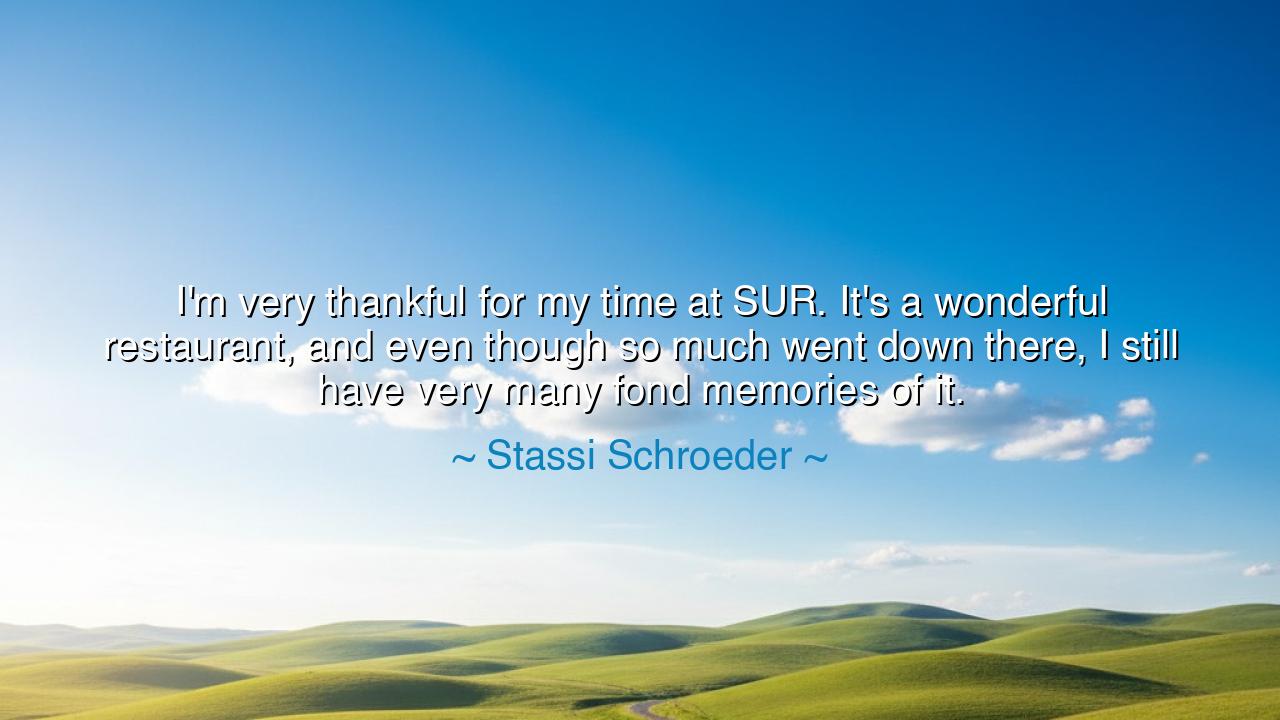
I'm very thankful for my time at SUR. It's a wonderful
I'm very thankful for my time at SUR. It's a wonderful restaurant, and even though so much went down there, I still have very many fond memories of it.






Hear the words of Stassi Schroeder: “I’m very thankful for my time at SUR. It’s a wonderful restaurant, and even though so much went down there, I still have very many fond memories of it.” These words hold within them the tension of life itself: the acknowledgment of struggle, conflict, and imperfection, alongside the gratitude for growth, friendship, and memory. They remind us that even places of trial can become places of blessing, and that the soul which is able to see goodness amid turbulence walks in wisdom.
The origin of this reflection rests in Schroeder’s time at SUR, the restaurant in Los Angeles that became famous not only for its food but for the lives, dramas, and stories told around it in the world of entertainment. For her, SUR was not merely a workplace but a crucible—a place where friendships were tested, mistakes were made, and identities were shaped under the weight of public eyes. In looking back, she chooses not bitterness but thankfulness. For even in the storm, there were memories of joy, laughter, and lessons learned.
History too gives us examples of this wisdom. Consider Victor Hugo, who spent years in exile from his homeland of France. His exile was painful, marked by isolation and hardship. Yet in later years he gave thanks for it, saying that the solitude sharpened his vision and allowed him to create works like Les Misérables, which would outlive him. Just as Hugo turned exile into a memory of growth, Schroeder transforms her turbulent past at SUR into a season to be grateful for. The wise learn to treasure not only the smooth waters, but the storms that tested them.
There is also in her words a recognition of place as sacred. Restaurants, schools, homes, workplaces—all are not just physical spaces, but vessels of memory. They carry within them the laughter of friends, the sting of arguments, the warmth of celebrations, the weight of farewells. Schroeder calls SUR “a wonderful restaurant” not because it was flawless, but because it became a stage where life was fully lived. Her words remind us that even imperfect places can hold perfect moments.
Her gratitude also speaks of acceptance. To say, “so much went down there” is to acknowledge imperfection, perhaps even regret. Yet her tone is not bitter—it is reflective. Gratitude does not erase hardship, but it transforms it. It allows the heart to look back on pain and still find beauty. Acceptance is not surrender; it is strength, the ability to say, “I would not erase these days, for they have shaped who I am.”
The lesson is clear: gratitude redeems memory. If we look back only with resentment, the past becomes a chain that binds us. But if we look back with thankfulness, the past becomes a teacher, turning even pain into wisdom. Schroeder’s words reveal that one can acknowledge difficulty without being consumed by it, and in so doing, one can carry forward the blessings while leaving behind the bitterness.
Practical actions arise from this teaching. Reflect on your own past—on the places where you worked, lived, or struggled. Instead of holding only the wounds, search for the lessons, the friendships, the moments of light. Speak gratitude for them aloud, so that they become part of your story, not as scars but as stepping stones. And when you leave behind a place, do so with both honesty and thankfulness, for this is how the soul finds peace.
Thus, let the words of Stassi Schroeder endure: be thankful even for the imperfect places, for they are where your story was shaped. For gratitude transforms memory, and memory, when honored rightly, becomes not a burden but a blessing—an inheritance of wisdom for the future.






AAdministratorAdministrator
Welcome, honored guests. Please leave a comment, we will respond soon